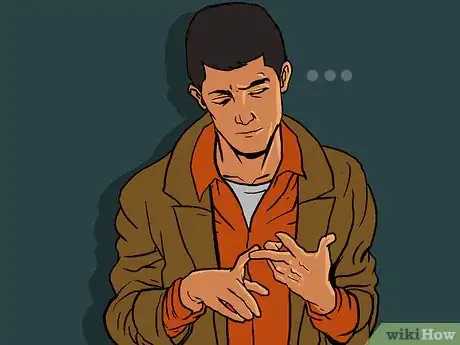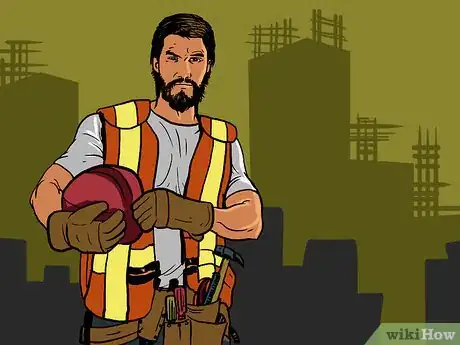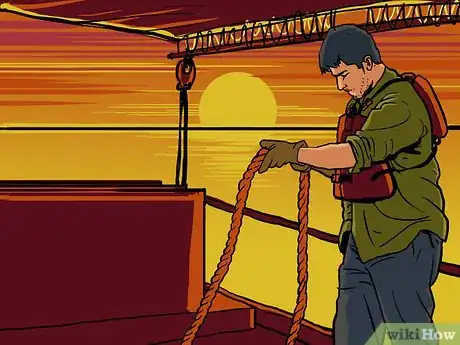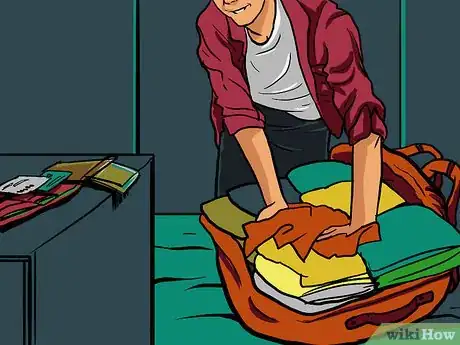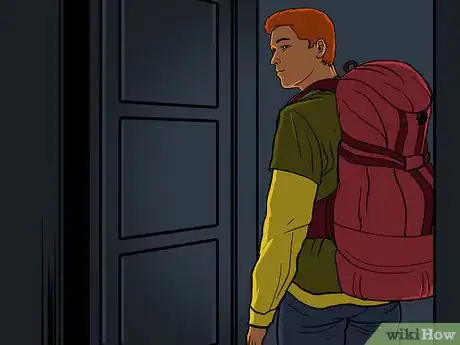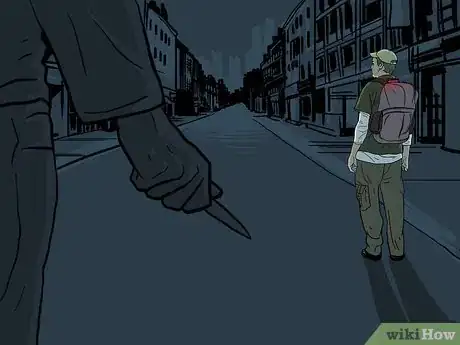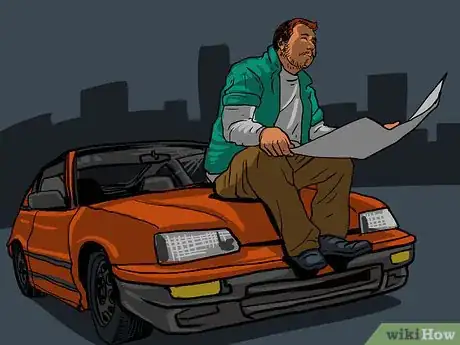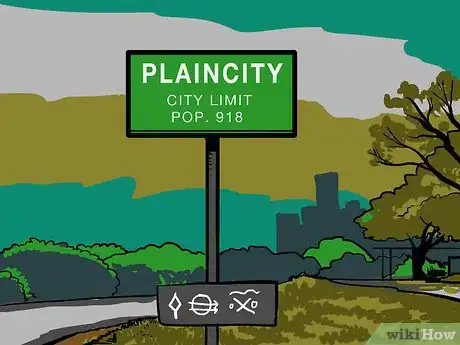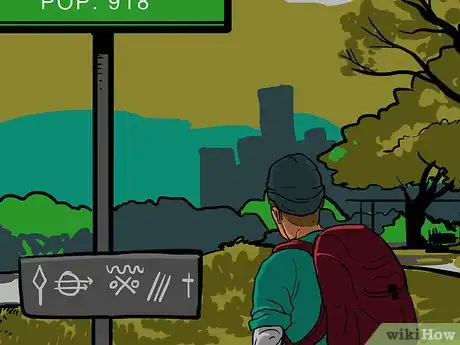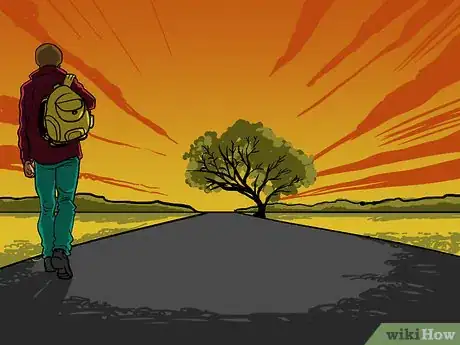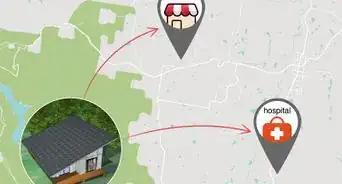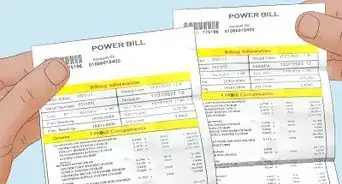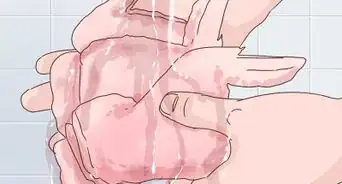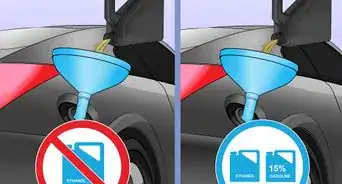wikiHow is a “wiki,” similar to Wikipedia, which means that many of our articles are co-written by multiple authors. To create this article, 139 people, some anonymous, worked to edit and improve it over time.
This article has been viewed 714,477 times.
Learn more...
Historically, many people have been forced into becoming hobos because of circumstances where jobs are so scarce that they have no choice but to travel from place to place in search of work. There are many theories of the origin of the word hobo, ranging from a contraction of the words "Hoe Boys" to one from the words "Homeward Bound". In any case, the American Heritage Dictionary defines a hobo as "one who wanders from place to place without a permanent home or a means of livelihood." But the dawn of the Internet and increased dissatisfaction with the 9-to-5 routine have led more and more people to wonder if earning a living while on the road is a viable alternative to the daily grind. If you're thinking about becoming an opportunistic and resourceful transient worker, keeping your costs low, your responsibilities simple, and your freedom intact, here are the questions you'll need to ask yourself—and the preparations you'll need to make.
Steps
-
1Remember the differences between hobos, tramps, and bums: hobos are people who travel and look for work, tramps are people who travel and don't look for work, bums are people who neither travel nor look for work.
-
2Take stock of your skills and experience. Historically, hobos have made their living from manual labor, but that doesn't always have to be the case. Any skill that is in wide demand and does not require an extended time commitment can be useful to a hobo. As long as you can advertise your services and earn people's trust (ideally through references), you can do anything. Some pursuits that lend themselves to this lifestyle are:
- Landscaping and construction - Many migrant workers who cross international borders find work in this area, as it is the least demanding in terms of language barriers. Having experience is essential, however, as you'd be required to work with potentially dangerous equipment and machinery.
- Farm hand - If you've ever thought about becoming a farmer, there are internships all over the world that offer housing, food, a stipend, and experience, in exchange for getting your hands dirty. You can follow harvest seasons around the country or around the globe. Progressive farms tend to provide better circumstances.
- Fishing - Serve as a deckhand, cook, or fisherman as you travel the high seas.
- Any web-based service such as writing, editing or programming.
Advertisement -
3Establish Plan B. This is a serious, life-altering decision. Don't abandon everything suddenly and disappear. You need something to come back to if your life on the road doesn't work out. Make sure all your debts are paid and responsibilities are handled before departure. If possible, have some savings set aside before you go, that you can access while you're on the road, if need be. Emergencies happen, and they cost money.
-
4Be prepared. You may like the romantic idea of leaving with nothing but the clothes on your back and whatever is in your wallet, but that is a sure-fire recipe for disaster. You must assume that you will be sleeping, cooking, traveling, and essentially living outdoors, unless you decide to drive a car.
- How will you get from place to place? Hobos are often associated with train-hopping, because this is what many hobos during the Great Depression did. A car can double as transportation and sleeping quarters, but keep in mind that gas is expensive, and upkeep on a vehicle is a major expense and if the expense bothers you, hitch-hiking is a good option since it's free. Some hobos prefer bicycles, but this will limit your range (to warm weather regions) and limit how much you can carry. A motorcycle can get you where you're going faster, but has maintenance requirements similar to those of a car, though not to the same degree. Buses are also an option: Greyhound, in the US at least, offers steep discounts when you purchase tickets a week in advance, and even more for still earlier purchases. Buy tickets at the station for the best deals; web purchases have an extra $3 or $4 tagged on whether the tickets are mailed or "on call".
- Where will you sleep? Unless the place you work can offer housing, you will have to sleep in your car (if you have one), urban camp, squat in an abandoned building, or stay in hostels or motels. Another option is using the Communities Directory online to find urban co-ops, land trusts, and other alternative housing arrangements, which often welcome guests. See directory.ic.org. Yet another option is a traveler's network such as couchsurfing.com or globalfreeloaders.com, which offer free lodging to those who intend to contribute (in kind, or in other ways). Consider the costs and dangers associated with each.
- Where will you take showers? Some campsites have showers, but many don't, so you may consider purchasing portable shower equipment. You can also obtain a membership to a national gym chain and use the showers there (provided you actually work out and maintain your appearance).
- How will you defend yourself? A nomadic lifestyle can be a dangerous one because you're constantly putting yourself in unfamiliar situations, and you're probably alone—both of which can make you a target for theft and assault. You'll need to outline some precautions you can take, such as always letting people know where you are, carrying a cell phone - and only going places where there's a reliable signal, having an alert system or weapon on you, etc. In addition, always know where you are so when you call for help you will be able to give them a location.
-
5Make a list of connections. Look at maps of the areas in which you'll be traveling, and determine whether or not there's anyone you know, directly or indirectly, who lives there. Ask your Aunt Sally if your great uncle Billy still lives in that cabin in the woods. Ask your friend if his cousin still works at the car dealership in Utah. Most important of all, ask them if it's okay if you can get in touch with those people in case of an emergency. Some people might offer to make arrangements so that you can actually visit, which is always nice. (Just be a good house guest!)
-
6Make an itinerary based on the type of work you plan to do, the connections you have in place, and the places you'd like to see. Do as much research as you can beforehand. Make a list of places you can stay, eat, shower, camp, etc. It's also wise to look up churches and shelters and any other services that are offered to the homeless. The more prepared you are, the more you'll enjoy your travels.
-
7Learn the hobo code. Historically hobos relied on a shared system of symbols that let fellow travelers know more about their current environment.The symbols can vary from place to place and may no longer be used in many areas. Here are some symbols to get you started:
- spearhead - defend yourself
- circle with two parallel arrows - get out fast, hobos not welcome
- wavy line (signifying water) above an X - fresh water and a campsite nearby
- three diagonal lines - not a safe place.
- cross - "angel food," (food served to hobos after a party)
-
8Hit the road! Leave your roots behind. Find a place to live and work from day to day. See the sights of each new place you visit. Make interesting friends (you never know when they might lend a helping hand). Life on the road means that every moment is your own. With no schedule and no responsibilities (except keeping yourself healthy), you must decide how to best use your time to achieve a balance between work, travel, relaxation, and entertainment. Enjoy the variety that each day has to offer...you're earning it.
-
9Don't hesitate to dumpster dive. You wouldn't believe the amount of free undamaged food that is thrown away all the time. For the best results check behind smaller grocery stores and fruit markets, as they usually don't invest money in a sealed garbage compactor (although these can sometimes be opened as well)—just be careful. Fast food chains are also usually good, but more traditional restaurants generally don't waste nearly as much food—although if you are really hungry you can usually find at least something there.
Community Q&A
-
QuestionDo hobos want to be hobos?
 Community AnswerPeople are sometimes forced to become hobos, but some people like the lifestyle and choose it.
Community AnswerPeople are sometimes forced to become hobos, but some people like the lifestyle and choose it. -
QuestionWhy would you I want to be a hobo?
 WikiHowGirl7042Community AnswerFor many reasons. You may want to travel but still make money, for example. Remember that hobos are not necessarily poor.
WikiHowGirl7042Community AnswerFor many reasons. You may want to travel but still make money, for example. Remember that hobos are not necessarily poor. -
QuestionHow can I look like a hobo?
 RoseCommunity AnswerWear old clothes that don't fit you well or match each other. Keep a kind of messy, dirty appearance. You wouldn't have had a bath for a while, so you might try to be a bit smelly.
RoseCommunity AnswerWear old clothes that don't fit you well or match each other. Keep a kind of messy, dirty appearance. You wouldn't have had a bath for a while, so you might try to be a bit smelly.
Warnings
- Don't trust everyone.⧼thumbs_response⧽
- If anyone says something about you, just ignore it. If things get serious, run away or call for help. Never fight back especially if it's a group.⧼thumbs_response⧽
- Investigate the workers' compensation laws in the areas where you will be traveling. If you should be injured on the job, it's important that you know what protection is offered, and what action you can take to ensure your protection.⧼thumbs_response⧽
- Do not neglect everything you have, or you will be left with nothing.⧼thumbs_response⧽
- Respect the law unless you are willing to spend some jail time and risk getting a criminal record.⧼thumbs_response⧽

